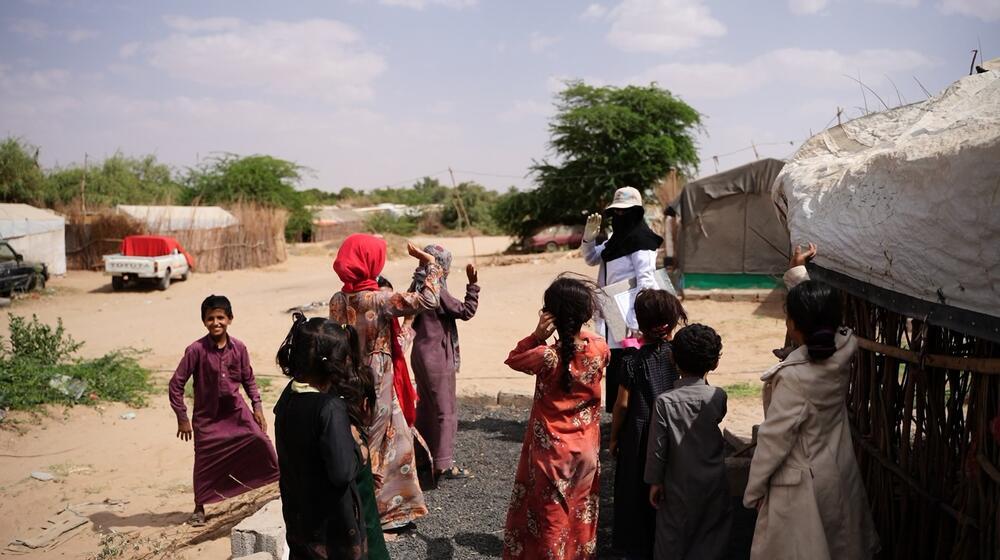Yemen/Bangladesh/Ukraine – “A few weeks ago, a pregnant woman called me late at night in desperate need of help,” Molok told UNFPA. “This woman lives in a camp that intersects with the area of the clashes. I decided to go to her at night, sneaking on foot with one of her relatives.”
Molok is a 30-year-old midwife in Marib, Yemen. Since losing her husband to the country’s grinding war, she has been raising her two sons alone and supporting the family by working at a UNFPA mobile clinic.
After safely delivering the baby, she recalled, “I returned to my tent, sneaking also during the night. I heard the sounds of bullets near me. I was in great fear… Working in the area of clashes may mean life or death, but we bear full responsibility to save the lives of others who are in dire need of us.”
The 19th of August is World Humanitarian Day, an occasion whose observation is more critical than ever considering the rising number and intensity of humanitarian crises around the world. “Humanitarian workers face serious threats and risks, often compounded by access constraints; these everyday heroes need our full support to operate safely and effectively,” said Dr. Natalia Kanem, UNFPA’s Executive Director, in a statement marking the day.
Most of these everyday heroes emerge from crisis-affected communities, like Molok.
Her country, Yemen, remains the site of one of the world’s largest humanitarian disasters, with only half of its hospitals still functioning. Her own family has relocated over and over again to find safety, but peril is never far away. Once, she was working at a hospital when it was overtaken by a warring party.
“Being displaced many times and continuing to work as a midwife has made me strong,” she said. “I now not only provide my medical services but also psychological support to patients who have been displaced like me.”
A place of understanding
Psychological support is also a form of first-aid in Ukraine, where UNFPA has supported the establishment of a centre providing psychological, medical and legal assistance to survivors of conflict-related violence. This includes gender-based violence and sexual violence, the incidence of which often increases during times of crisis.
“The main goal is to prevent re-traumatization of survivors and provide an environment of trust,” said Olga Stefanishina, the Deputy Prime Minister for European and Euro-Atlantic Integration of Ukraine, at the launch of the centre.
Those who have lived through conflict and disaster are often able to provide services from a place of deep understanding.
That is the case for Nourul Amin, a 19-year-old community activist working to end gender-based violence in his refugee camp in Cox’s Bazar, Bangladesh.
Nourul escaped horrific violence targeting his Rohingya community in Myanmar in 2017. But for too many Rohingya families that escaped to displacement camps, the violence followed close behind them. As communities were uprooted, protection mechanisms fell away. Many people crowded into camps with little privacy. Stresses and tensions often arose within families. These conditions, alongside harmful gender norms, left people – women and girls in particular – vulnerable to various forms of violence.
Nourul is working to stop this vicious cycle. He is part of a programme called SASA!, for Start, Awareness, Support and Action, which is helping people to challenge the norms that underlie gender-based violence.
More than 2,300 activists have been trained, including both male and female community and religious leaders, both within Rohingya refugee camps and among larger host communities. Since December 2020, they have reached nearly 100,000 people with messages about gender equality and ending violence.
“Being a community activist means being the change agent that we wish to see in our community and in the world,” Nourul said.
It takes a village
When a disaster strikes, whole buildings and towns may crumble, but solidarity – the spirit that binds whole communities – prevails.
Although Yemeni midwife Molok has been forced to flee her home time and again, she finds community wherever she goes, connecting to those in need through her compassion and care.
“Just last week, a woman [in labour] called me from a remote area,” she explained. “When I arrived, I found her on the verge of death and suffering from severe bleeding. She did not have any money and neither did I. So I gave my gold ring to the pharmacy in return for a few medical supplies. I saved her from a very difficult situation.”
Molok’s dedication and sacrifice do not exist in a vacuum. Her actions take place alongside those of social workers, therapists, doctors, delivery drivers, and many others.
Together, Dr. Kanem highlights, they are “working on the frontlines of emergencies to build a healthier, safer, and more equitable planet.”


